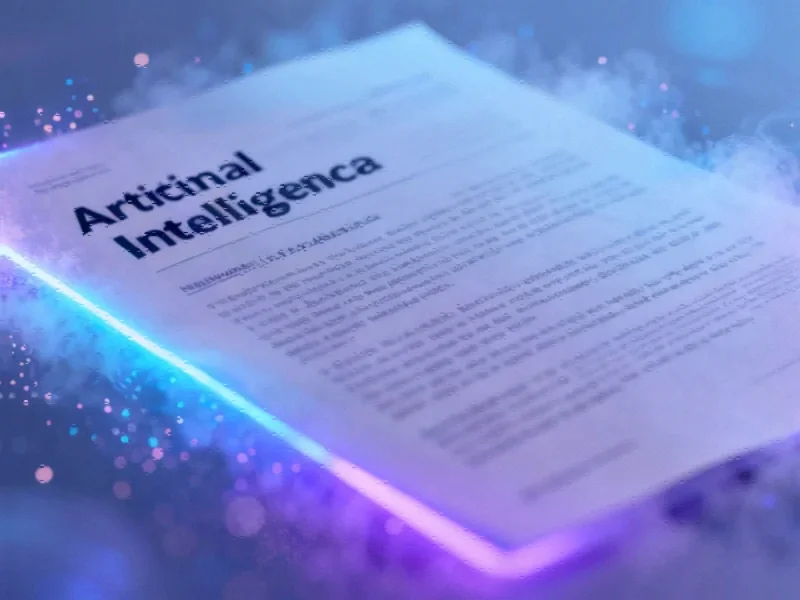Copyright and Compensation Debates Intensify
The question of whether creators should be compensated when AI systems are trained on copyrighted human-created content is expected to reach critical mass in 2026, according to industry analysts. Proposed solutions reportedly include accessible opt-out mechanisms, transparent consent systems, and revenue-sharing models. Court cases have yielded mixed results so far, with rulings favoring both AI companies and artists in various jurisdictions. Sources indicate that 2026 may bring greater clarity to this complex issue, potentially establishing fairer frameworks without restricting innovation.
Table of Contents
- Copyright and Compensation Debates Intensify
- Autonomous AI Agents Face Regulatory Scrutiny
- Workforce Transformation Demands Ethical Response
- Accountability Frameworks Take Center Stage
- International Regulatory Alignment Emerges as Critical Challenge
- Content Integrity and Misinformation Controls Expand
- Corporate AI Governance Becomes Operational Priority
- Explainable AI Transitions from Aspiration to Requirement
- Ethical Foundations Become Business Imperative
Autonomous AI Agents Face Regulatory Scrutiny
AI agents capable of performing complex tasks with minimal human interaction are raising significant questions about decision-making boundaries, analysts suggest. The extent to which machines should operate without human oversight and who bears responsibility when problems occur remains unclear. According to reports, legislators are expected to address autonomy thresholds and establish penalties for organizations that allow AI systems to act irresponsibly. The development of clear guardrails is considered essential to ensure these systems align with human interests.
Workforce Transformation Demands Ethical Response
With recruitment in entry-level administrative and clerical positions reportedly falling by 35 percent due to AI implementation, the ethical responsibility of employers is coming into sharp focus. Analysts suggest that 2026 will see increased pressure on companies to implement retraining and skilling initiatives. Meanwhile, governments are expected to address workers’ rights impacts and potentially mandate that savings from AI-driven workforce reductions be directed toward mitigating broader societal consequences.
Accountability Frameworks Take Center Stage
The question of ultimate responsibility when AI systems make errors remains unresolved, with no clear rules currently determining whether creators, data providers, or users bear liability. According to industry reports, measures under consideration include requiring organizations to ensure human accountability for harm caused by algorithmic bias, hallucinations, or poor decisions. Resolving this accountability gap is expected to be a priority for both businesses and legislators throughout 2026.
International Regulatory Alignment Emerges as Critical Challenge
While AI operates globally across borders, regulation remains fragmented across national jurisdictions, creating potential mismatches and accountability gaps. The European Union, China, and India have implemented national AI laws, while the United States addresses regulation at the state level. Analysts suggest that establishing international consensus and regulatory frameworks will become a dominant topic in AI governance discussions throughout the coming year.
Content Integrity and Misinformation Controls Expand
The proliferation of AI-generated content has raised concerns about misinformation, trust erosion in democratic institutions, and social division amplification. According to reports, legislators are drafting laws that would mandate labeling of AI-generated content and criminalize harmful deepfakes. Meanwhile, individuals are expected to develop more critical approaches to evaluating information sources in 2026 as part of broader societal responsibility efforts.
Corporate AI Governance Becomes Operational Priority
Organizations are reportedly waking up to the risks associated with unauthorized or unmonitored AI use by employees. The implementation of comprehensive codes of conduct and best practice policies is expected to become a priority for human resources departments globally. Analysts suggest that companies failing to establish robust AI governance frameworks face increased vulnerability to cyber attacks, copyright infringement claims, financial penalties, and potentially irreversible damage to customer trust.
Explainable AI Transitions from Aspiration to Requirement
The inherent complexity of AI algorithms often makes decision-making processes difficult to understand, a problem sometimes compounded by commercial secrecy. According to industry reports, 2026 will bring increased pressure on developers to adopt principles promoting explainable AI, particularly for systems impacting human lives through healthcare, financial, or other critical decisions. Organizations are expected to implement more sophisticated methods for auditing the transparency of their AI-driven decision-making processes.
Ethical Foundations Become Business Imperative
Analysts suggest that ethical AI considerations are transitioning from peripheral concerns to core business fundamentals. The organizations positioned to thrive in 2026 will reportedly be those embedding ethics and governance into every AI decision, treating transparency, accountability, and fairness as strategic priorities rather than compliance obligations. This shift reflects growing recognition that ethical frameworks are essential for both innovation and maintaining public trust in artificial intelligence systems.
Related Articles You May Find Interesting
- Microsoft Introduces Mico, an Emotional AI Assistant as Clippy’s Successor
- Intel Stock Surges Following Strong Q3 Results and Upbeat Forecast
- Tech Analysts Predict AI Investment Bubble Burst by 2026, Debate Post-Collapse S
- Australia’s Central Bank Chief Outlines Four-Pronged Strategy for Payments Moder
- Underground Physics Experiment Advances Search for Rare Particle Decay with Nois
References
- https://bernardmarr.com/7-great-ai-hopes-that-could-change-the-world/
- https://www.theguardian.com/technology/2025/jun/26/meta-wins-ai-copyright-law…
- https://www.thebookseller.com/news/anthropic-to-pay-15bn-to-authors-in-ai-cop…
- https://bernardmarr.com/…/
- https://ctomagazine.com/ai-czar-chief-ai-officer/
- https://www.upguard.com/blog/digital-india-act
- https://www.scmp.com/tech/policy/article/3323959/chinas-social-media-platform…
- https://www.k12dive.com/…/
- https://bernardmarr.com/…/
- http://en.wikipedia.org/wiki/Ethics
- http://en.wikipedia.org/wiki/Artificial_intelligence
- http://en.wikipedia.org/wiki/Technological_change
- http://en.wikipedia.org/wiki/Police
- http://en.wikipedia.org/wiki/Autonomy
This article aggregates information from publicly available sources. All trademarks and copyrights belong to their respective owners.
Note: Featured image is for illustrative purposes only and does not represent any specific product, service, or entity mentioned in this article.



